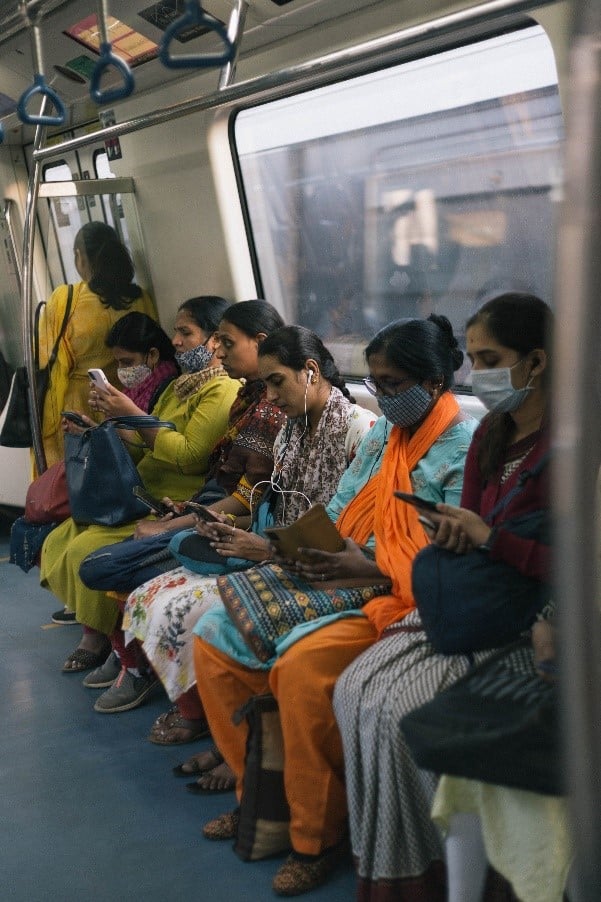
India’s transport system is undergoing a significant social transition, reflecting the broader push for inclusivity and equity across the nation. Exploring the advancements in public transport systems, with a special focus on Delhi and other progressive cities, that have taken substantial steps to ensure inclusivity, particularly for women and other disadvantaged groups, especially the transgender community (Hijras), these initiatives, driven by both government regulations and private sector participation, mark a positive momentum towards equity in transport, though challenges remain on the road ahead.
India has implemented a robust framework of laws and regulations to promote inclusivity in the transport sector, ensuring safety and accessibility for all, particularly women and disadvantaged groups.
Some of the key legal protections were implemented within the last few years, such as the Transgender Persons (Protection of Rights) Act, 2019: This landmark legislation is a cornerstone for the rights of transgender individuals in India, explicitly prohibiting discrimination across multiple domains, including education, employment, healthcare, and providing access to public services. The Act mandates the inclusion of transgender persons in both public and private establishments and upholds their right to self-identify their gender.
Also, a funding scheme called the Nirbhaya Fund, was established to enhance women’s safety across various public sectors, including transport. This fund has been instrumental in financing projects aimed at improving infrastructure, such as the installation of CCTV cameras, emergency response systems, and the deployment of women-centric transport services. These measures are critical in making public transport safer and more accessible for women.
Together, these and several other legal provisions and funding mechanisms highlight India’s commitment to creating an inclusive and safe transport environment for all.
Delhi has taken significant steps to enhance the safety and accessibility of public transport for women, aiming to foster a more inclusive environment. One of the most impactful initiatives introduced by the Delhi government is the provision of free bus rides for women. Launched in 2019, this program allows women to travel for free on Delhi Transport Corporation (DTC) and cluster buses. The primary objective is to make public transport more accessible and secure for women, thereby enabling greater participation in the workforce. The initiative also addresses the economic barriers that women face, particularly those from lower-income groups, by reducing their daily commuting costs. This has not only increased the number of women using public transport but has also enhanced their mobility across the city.
Another critical measure to ensure the safety of female passengers has been the introduction of women-only coaches in the Delhi Metro. These coaches, available on every train, provide a safe and secure space for women, helping them avoid harassment and other challenges often faced in crowded public transport. The success of this initiative can be seen in the increased confidence of women traveling alone, especially during peak hours.
However, these initiatives are not limited to women only. Delhi Transport Corporation DTC has announced free travel for transgender individuals, allowing transgender persons to travel with dignity and respect, ensuring they have equal access to public transport. This initiative, still in the process of implementation, is expected to further empower the transgender community by removing financial barriers to mobility. The Transport Department is working on collecting data on the number of transgender identity cards issued in the Capital and plans to conduct awareness programs to encourage more transgender individuals to enrol for these free passes.
Across India, many initiatives reflect a forward-thinking approach to creating a more inclusive and equitable public transport system. By addressing the specific needs of women and transgender individuals, these measures not only enhance safety and accessibility but also contribute to a more just and inclusive society. From Bangalore’s Pink Hoysalas, Kochi’s Gender Park and Mumbai’s Ladies Special Trains to Surat’s Pink Auto Project, cities are implementing innovative solutions to address the unique needs of women and marginalized communities.
In recent years, the landscape of public transport has witnessed a transformative shift, with women increasingly stepping into roles traditionally dominated by men. From bus drivers and taxi drivers to metro operators, women are challenging entrenched gender norms and reshaping the dynamics of the transportation industry.
The increasing presence of women in transport roles is supported by a range of policies and programs designed to facilitate their entry and success in these professions. Governments and private operators have introduced various initiatives to support women drivers and operators, addressing barriers such as training, safety, and career development.
The hiring of women drivers has not only provided women with employment opportunities but also contributed to a more inclusive and diverse workforce. Women in these roles bring a different perspective and approach to their work, often leading to enhanced service quality and improved safety standards. Their presence in public transport roles also serves as a powerful symbol of progress and equality, encouraging more women to consider careers in transportation.
As more women step into these roles, they not only contribute to the efficiency and effectiveness of public transport systems but also drive social change by demonstrating that gender should not be a limiting factor in career opportunities. The ongoing efforts to support and encourage women in transport roles represent a broader commitment to gender equality and a more inclusive workforce across all sectors.
NDC Transport Initiative for Asia (NDC-TIA) is part of the International Climate Initiative (IKI). The German Federal Ministry for Economic Affairs and Climate Action (BMWK) supports this initiative on the basis of a decision adopted by the German Bundestag. It supports China, India, and Viet Nam as well as regional and global decarbonisation strategies to increase the ambition around low-carbon transport. For more information on the project, please visit: https://www.ndctransportinitiativeforasia.org/.
 @Suneha Hameed (WRI India), flickr
@Suneha Hameed (WRI India), flickr

Anneli Stutz
anneli.stutz@giz.de
Visit profile

Leelavathy Talapaneni Ramamurthy
leelavathy.talapaneniramamurthy@giz.de
Visit profile